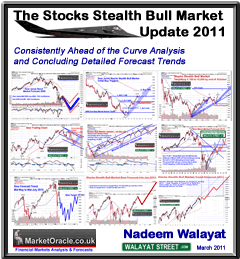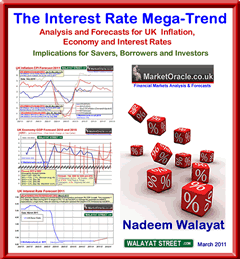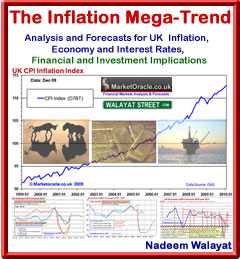How to Protect Your Bank Deposits, Savings From Euro-zone Collapse Financial Armageddon
Personal_Finance / UK Banking Dec 03, 2011 - 06:41 AM GMTBy: Nadeem_Walayat
 The Governor of the Bank of England, Mervyn King, woke up form financial paralysis to warn UK Banks to prepare themselves against the risks of a collapse of the Euro-zone by forgoing annual bonus payments (based on fictitious tax payer funded profits) and instead shore up their capital against the wave of defaults and bankruptcies both banking and commercial that would follow a collapse of the Euro-zone.
The Governor of the Bank of England, Mervyn King, woke up form financial paralysis to warn UK Banks to prepare themselves against the risks of a collapse of the Euro-zone by forgoing annual bonus payments (based on fictitious tax payer funded profits) and instead shore up their capital against the wave of defaults and bankruptcies both banking and commercial that would follow a collapse of the Euro-zone.
"The crisis in the euro area is one of solvency and not liquidity
And the interconnectedness of major banks means the banking systems and economies around the world are all affected.
Only the governments directly involved can find a way out of this crisis. But here in the UK we must try to bolster the resilience of the financial system better to withstand the storms that may come in our direction
What we are trying to do is to say where there are opportunities to increase capital and liquidity, take them."
How to Protect Your Bank Deposits from a Collapse of the Eurozone
 Whilst I actually rate the risk of actual euro-zone collapse as low (see 28 Nov 2011 - Eurozone Being Swallowed by Expanding Debt Black Holes, Mega Bond Market Profits and Default Booms ), however you really do need to protect your bank deposits because you are not being paid to for this risk as I have covered several times over the past year and more recently at length in Savers Protect Your Deposits From Bankrupting Banks and Quantitative Inflation:
Whilst I actually rate the risk of actual euro-zone collapse as low (see 28 Nov 2011 - Eurozone Being Swallowed by Expanding Debt Black Holes, Mega Bond Market Profits and Default Booms ), however you really do need to protect your bank deposits because you are not being paid to for this risk as I have covered several times over the past year and more recently at length in Savers Protect Your Deposits From Bankrupting Banks and Quantitative Inflation:
Steps You Need to Take Now !
The following are my updated lists of tasks you need to do to protect your deposits because you are NOT being paid to carry the REAL RISK OF LOSS OF FUNDS ON DEPOSIT!
1. Ensure that you have at least 2 current accounts across banking groups and at least one with a safer bank such as HSBC.
2. Next make a list of all of your deposit / bank accounts, with the amounts on deposit.
3. Now group your accounts by banking sector group (see list here as a guide).
4. If you are anywhere near the £85k limit with any banking group then move those excess funds immediately! and Especially if it is a Eurozone bank
5. Small banks and building societies are at greater risk than larger banks and building societies because the government is the larger banks such as HBOS pose a greater risk to the financial system and economy so the government will be more reluctant to let them fail, but that does not mean they will actually cover deposits beyond £85k in the event of a collapse, so you still need to limit exposure to £85k
6. Consider transferring funds to your spouse so as utilise their compensation limit across banking groups, so you can double your compensation coverage by opening an account for your spouse with each bank.
7. Ensure you have procedures in place so that you can at short notice transfer funds from high risk banks to lower risk banks so as to limit the fallout from any banking system crisis. For instance open an NS&I Direct Saver account NOW (pays 1.75% gross), then use this during an unfolding sovereign debt crisis event to transfer your cash to as this is the safest deposit account available for UK depositors (Max £2mill, Min £1). Again do this now as you may not be able to do so during a debt crisis event due to high demand for the account. This is an imperative - NS&I is the safest bank in the UK, use it for short-term insurance - NOW!
Instant Access Savings Accounts with Lower Risk banks
- NS&I - 1.75% - Government 100% Guarantee
- Tesco - 2.90% (includes 1.65% bonus for 12 months)
- HSBC - 0.75% (includes 0.5% bonus if you do not withdraw in a calendar month)
Higher Risk banks
- Barclays - 1.25% (includes 0.35% bonus when you do not withdraw in a month).
- SMILE (Co-op) 0.25%
Extreme High Risk Banks
- Santander - 3.1% (includes 2.6% bonus for 12 months) - Euro-zone Bank
- ING Direct - 3% (includes a 2.46% bonus if you do not withdraw in a month) - Euro-zone Bank
- Halifax Online Saver - 2.8% (includes 2.7% bonus for 12months).
All accounts pay significantly less than current CPI Inflation of 5%.
8. Do not have ANY savings are fixed deposit exposure to banks that do not fall under the UK Financials Services Compensation Scheme.
9. Avoid exposure to Euro-zone banks and at the very least PIIGS banks, that is Greece, Ireland, Spain, Portugal and Italy as these are at the most risk of going bust thus triggering a lengthy process for savers having to wait for compensation. Remember that if Spain comes under pressure following perhaps Ireland and Portugal joining Greece, then the risks posed to the likes of Santander depositors will also significantly rise.
10. Keep enough in cash to cover at least 1 months expenditure, (I keep 2 months worth of cash).
11. Utilise instant transfer accounts between spouses, i.e. if you have accounts with the Halifax then you can instantly transfer funds between one another, therefore during a crisis you can instantly reduce the exposure if one person is above the £85k compensation limit at that time.
What is Probably Likely to Happen IF the Euro-zone Collapses
I expect the UK government would nationalise the bankrupting banks either in part or full as they did with Northern Rock, Lloyds and HBOS, for if depositors in any significant number actually started to lose any of their deposits then that would result in a catastrophic loss of confidence in the UK financial system and spark runs on all banks.
My best minimum advice is to prepare for the worst rather than leave it to chance, because if the government is facing a bank rescue bill that runs in the trillions it may decide that the pain of closing the banking system for a few weeks (Extended Bank Holiday Month) is better than the implications of more than doubling the national debt which would make George Osbourne's £140 billion annual deficit look like peanuts.
A closure of the banking system (Bank Holiday Month) will result in a huge drain on cash in the economy, therefore I suspect the Bank of England has already secretly prepared itself for this eventually by printing a huge quantity of actual bank notes by the container load, ready to ship out as soon as the crisis bites, which would be necessary to cover a closure of the banking system the effect of this would be highly inflationary, because printing actual bank notes is the same as that which happened during Weimar Germany sparking hyperinflation when people ended up buying loafs of bread with Wheel barrows full of worthless currency, this is what would happen, inflation would go through the roof, forget 5% per year, we would be at 5% per month! So a closure of the banking system would probably not be the worst of what could follow as I will elaborate upon in my next in-depth analysis, ensure you are subscribed to my always free newsletter to get this in your email in box.
What is Most Probable
Summarising a series of recent articles (walayatstreet.com), ignore what the ECB and German politicians are publically stating, they WILL print money, they WILL bailout the european banks because the Inflation reasons for not printing money are fundamentally flawed, perhaps it has not dawned on those in charge yet because they are listening to clueless academics. The reason is this, if they fear inflation from QE money printing then what the hell do they think will happen to the Euro-zone inflation rates if the Euro collapses ?
It is all brinkmanship, the Germans want the southern states to cut their budget deficits so they are delaying the inevitable money printing bailout to ensure countries such as Italy suffer enough pain to adopt fiscal responsibility, however the risk is they ms-calculate and the markets blow the euro up, that is the bottom line risk that the Germans have miscalculated and start to print money via the ECB too late.
What am I doing ?
I have pulled my funds out of all euro-zone banks.
I am in the process of exchanging most of my cash for hard assets such as property and already am stocked up to the eyeballs with inflation mega-trend leveraged assets such as commodities, and dividend increasing stocks.
Your wealth protecting analyst.
Source and Comments: http://www.marketoracle.co.uk/Article31904.html
By Nadeem Walayat
Copyright © 2005-2011 Marketoracle.co.uk (Market Oracle Ltd). All rights reserved.
Nadeem Walayat has over 25 years experience of trading derivatives, portfolio management and analysing the financial markets, including one of few who both anticipated and Beat the 1987 Crash. Nadeem's forward looking analysis focuses on UK inflation, economy, interest rates and housing market. He is the author of three ebook's - The Inflation Mega-Trend; The Interest Rate Mega-Trend and The Stocks Stealth Bull Market Update 2011 that can be downloaded for Free.
Nadeem is the Editor of The Market Oracle, a FREE Daily Financial Markets Analysis & Forecasting online publication that presents in-depth analysis from over 600 experienced analysts on a range of views of the probable direction of the financial markets, thus enabling our readers to arrive at an informed opinion on future market direction. http://www.marketoracle.co.uk
Disclaimer: The above is a matter of opinion provided for general information purposes only and is not intended as investment advice. Information and analysis above are derived from sources and utilising methods believed to be reliable, but we cannot accept responsibility for any trading losses you may incur as a result of this analysis. Individuals should consult with their personal financial advisors before engaging in any trading activities.
Nadeem Walayat Archive |
© 2005-2022 http://www.MarketOracle.co.uk - The Market Oracle is a FREE Daily Financial Markets Analysis & Forecasting online publication.






